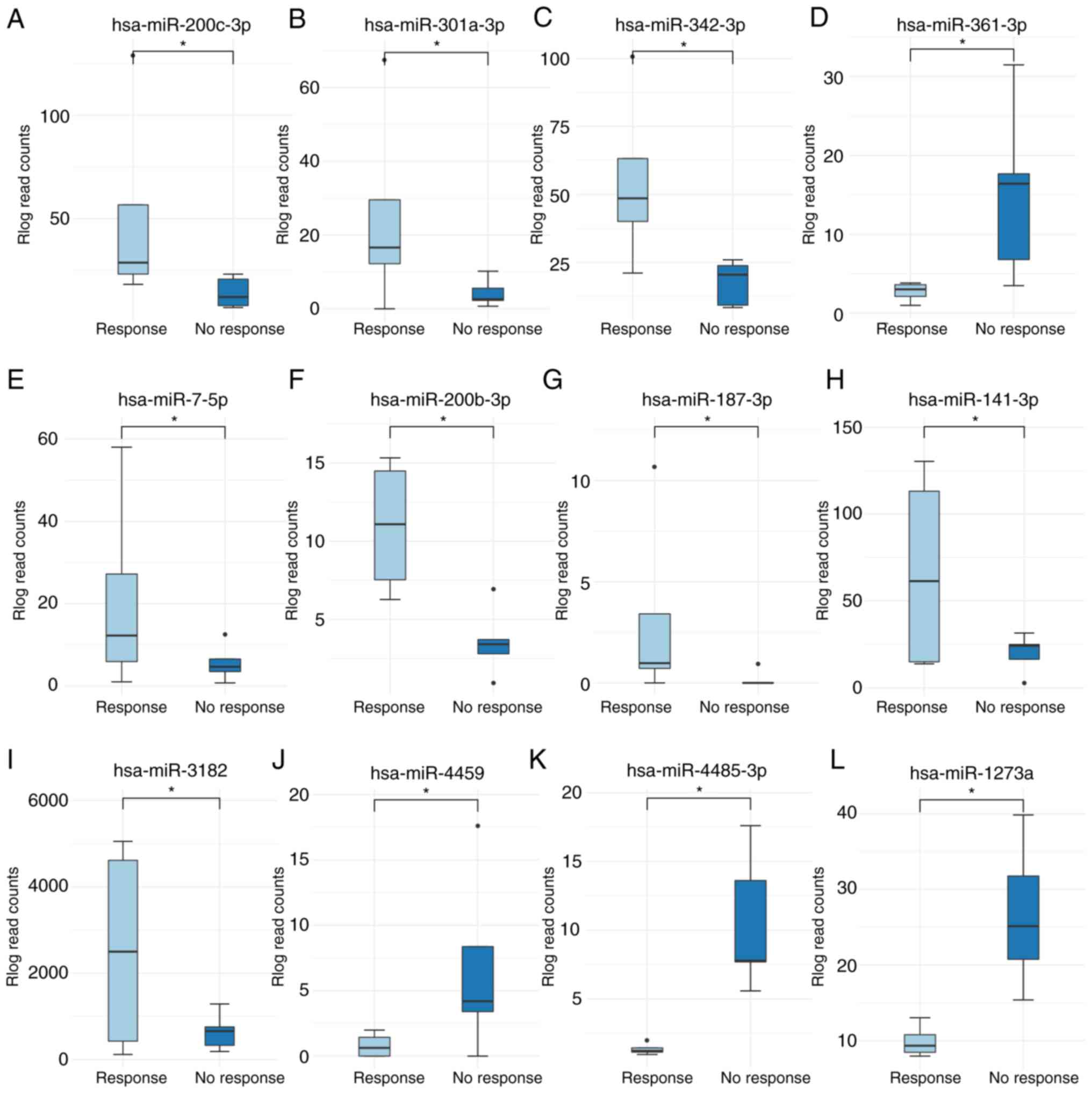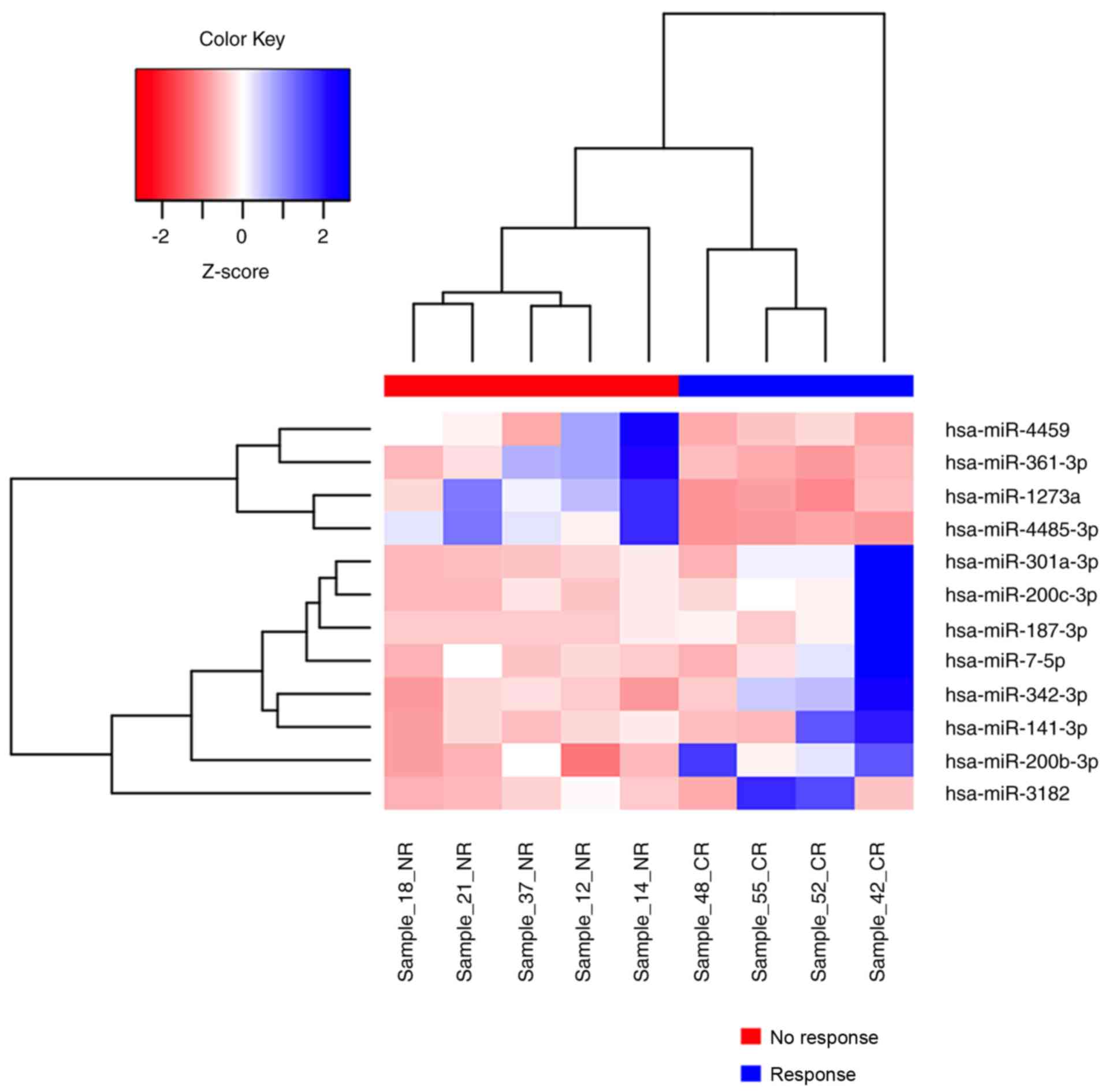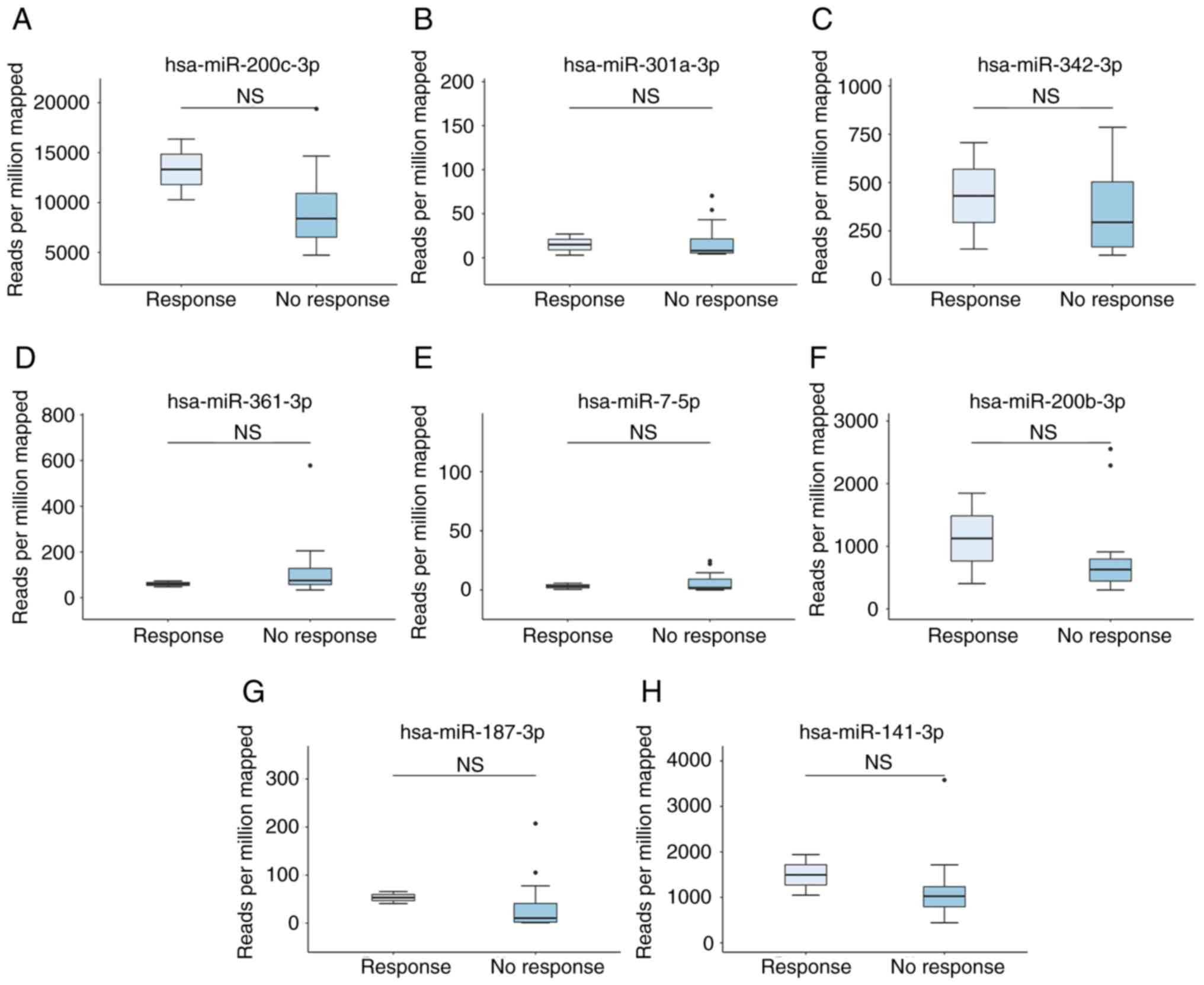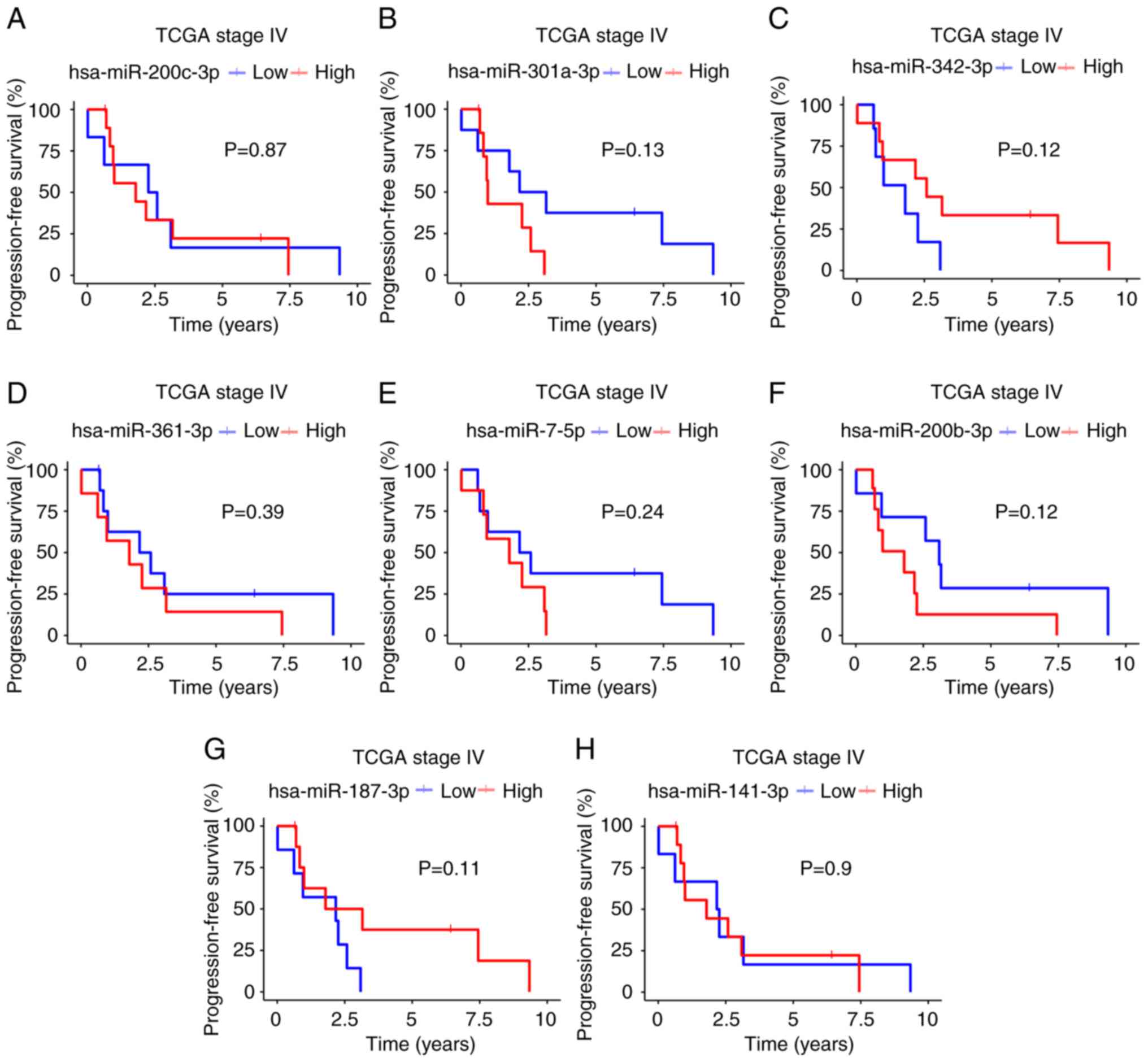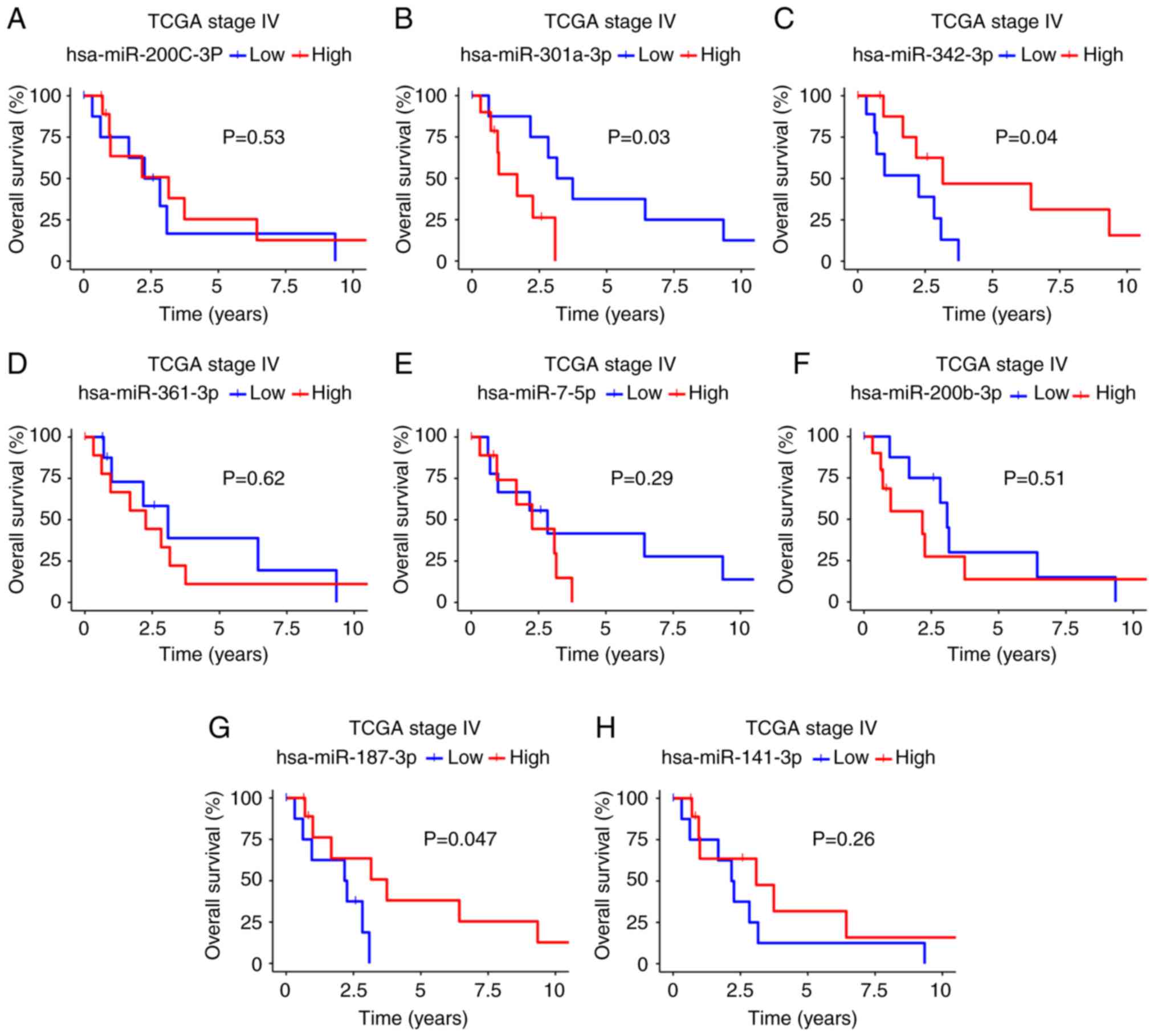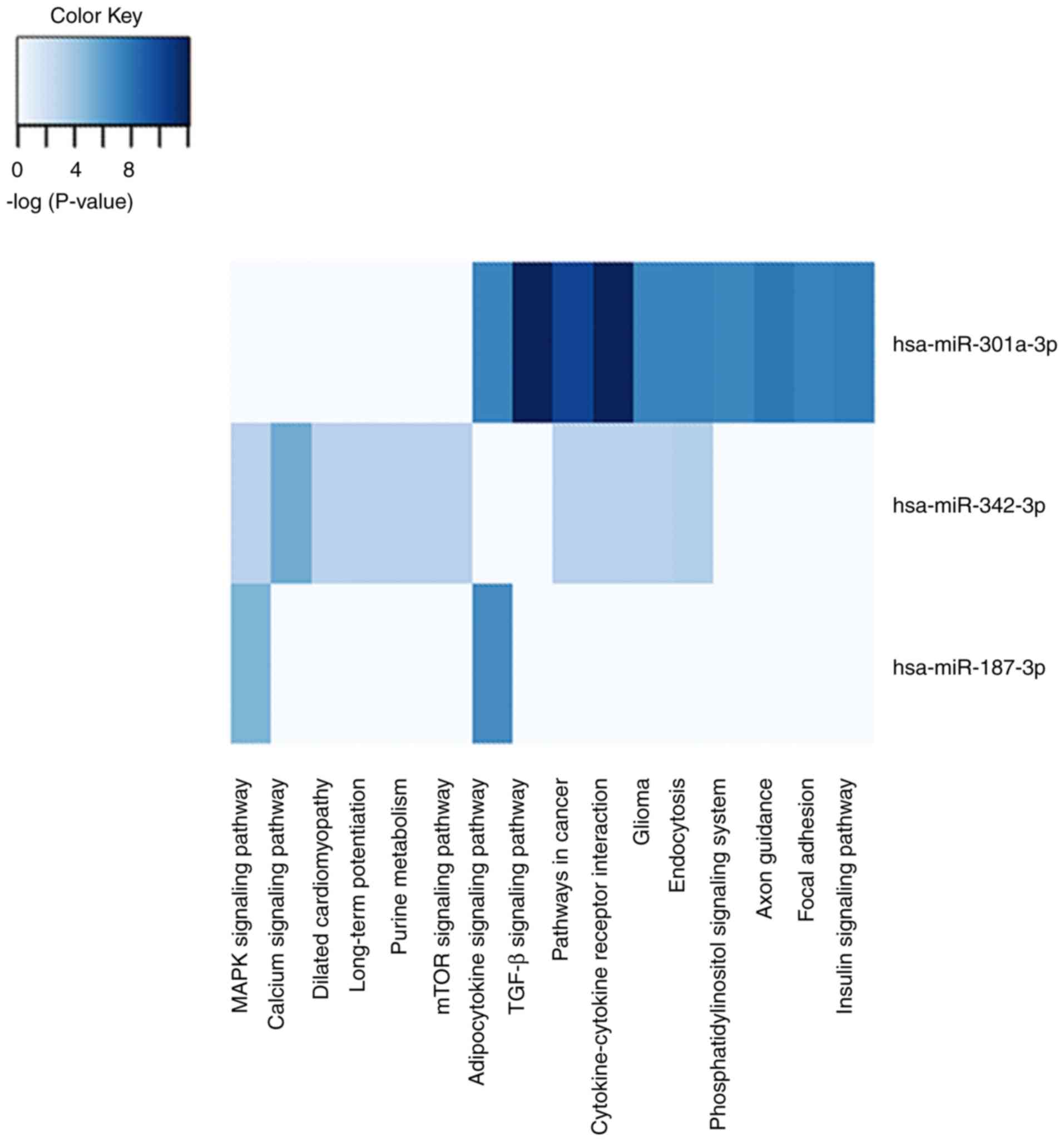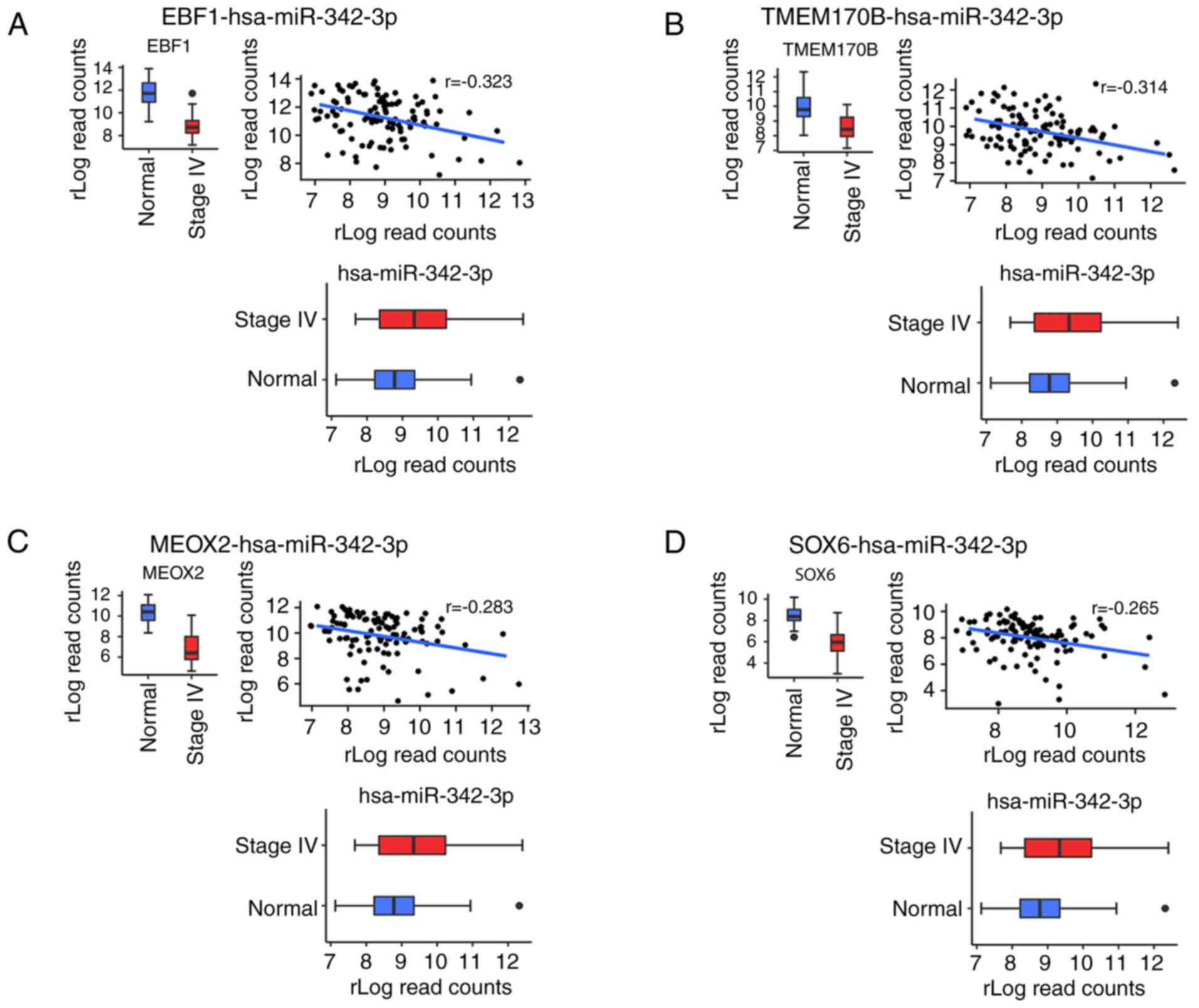|
1
|
Gonzalez-Angulo AM, Morales-Vasquez F and
Hortobagyi GN: Overview of resistance to systemic therapy in
patients with breast cancer. Adv Exp Med Biol. 608:1–22. 2007.
View Article : Google Scholar : PubMed/NCBI
|
|
2
|
Visovsky C: Treatment considerations for
the management of patients with hormone receptor-positive
metastatic breast cancer. J Adv Pract Oncol. 5:321–330. 2014.
|
|
3
|
Berthold D: Third consensus on medical
treatment of metastatic breast cancer. Ann Oncol. 21:665author
reply 655-656. 2010. View Article : Google Scholar
|
|
4
|
Cancer Stat Facts: Female Breast Cancer.
https://seer.cancer.gov/statfacts/html/breast.html.
Accessed January 31, 2019.
|
|
5
|
Haynes B, Sarma A, Nangia-Makker P and
Shekhar MP: Breast cancer complexity: Implications of intratumoral
heterogeneity in clinical management. Cancer Metastasis Rev.
36:547–555. 2017. View Article : Google Scholar : PubMed/NCBI
|
|
6
|
Bakker JL, Wever K, van Waesberghe JH,
Beeker A, Meijers-Heijboer H, Konings IR and Verheul HMW: What is
the benefit of treatment with multiple lines of chemotherapy for
patients with metastatic breast cancer? A retrospective cohort
study. Cancer Epidemiol. 39:848–853. 2015. View Article : Google Scholar : PubMed/NCBI
|
|
7
|
Lee Y, Jeon K, Lee JT, Kim S and Kim VN:
MicroRNA maturation: Stepwise processing and subcellular
localization. EMBO J. 21:4663–4670. 2002. View Article : Google Scholar : PubMed/NCBI
|
|
8
|
Bovell L, Shanmugam C, Katkoori VR, Zhang
B, Vogtmann E, Grizzle WE and Manne U: miRNAs are stable in
colorectal cancer archival tissue blocks. Front Biosci (Elite Ed).
4:1937–1940. 2012. View
Article : Google Scholar
|
|
9
|
Occhipinti G, Giulietti M, Principato G
and Piva F: The choice of endogenous controls in exosomal microRNA
assessments from biofluids. Tumour Biol. 37:11657–11665. 2016.
View Article : Google Scholar : PubMed/NCBI
|
|
10
|
Campos-Parra AD, Mitznahuatl GC,
Pedroza-Torres A, Romo RV, Reyes FIP, López-Urrutia E and
Pérez-Plasencia C: Micro-RNAs as potential predictors of response
to breast cancer systemic therapy: Future clinical implications.
Int J Mol Sci. 18:2017. View Article : Google Scholar : PubMed/NCBI
|
|
11
|
Gradishar WJ, Anderson BO, Balassanian R,
Blair SL, Burstein HJ, Cyr A, Elias AD, Farrar WB, Forero A,
Giordano SH, et al: NCCN guidelines insights: Breast cancer,
version 1. 2017. J Natl Compr Cancer Netw. 15:433–451. 2017.
View Article : Google Scholar
|
|
12
|
Watanabe H, Okada M, Kaji Y, Satouchi M,
Sato Y, Yamabe Y, Onaya H, Endo M, Sone M and Arai Y: New response
evaluation criteria in solid tumours-revised RECIST guideline
(version 1.1). Gan To Kagaku Ryoho. 36:2495–2501. 2009.In Japanese.
PubMed/NCBI
|
|
13
|
Vitsios DM and Enright AJ: Chimira:
Analysis of small RNA sequencing data and microRNA modifications.
Bioinformatics. 31:3365–3367. 2015. View Article : Google Scholar : PubMed/NCBI
|
|
14
|
Love MI, Huber W and Anders S: Moderated
estimation of fold change and dispersion for RNA-seq data with
DESeq2. Genome Biol. 15:5502014. View Article : Google Scholar : PubMed/NCBI
|
|
15
|
Colaprico A, Silva TC, Olsen C, Garofano
L, Cava C, Garolini D, Sabedot TS, Malta TM, Pagnotta SM,
Castiglioni I, et al: TCGAbiolinks: An R/Bioconductor package for
integrative analysis of TCGA data. Nucleic Acids Res. 44:e712016.
View Article : Google Scholar :
|
|
16
|
Tibshirani R: A simple method for
assessing sample sizes in microarray experiments. BMC
Bioinformatics. 7:1062006. View Article : Google Scholar : PubMed/NCBI
|
|
17
|
Rapaport F, Khanin R, Liang Y, Pirun M,
Krek A, Zumbo P, Mason CE, Socci ND and Betel D: Erratum to:
Comprehensive evaluation of differential gene expression analysis
methods for RNA-seq data. Genome Biol. 16:2612015. View Article : Google Scholar : PubMed/NCBI
|
|
18
|
Costa-Silva J, Domingues D and Lopes FM:
RNA-Seq differential expression analysis: An extended review and a
software tool. PLoS One. 12:e01901522017. View Article : Google Scholar : PubMed/NCBI
|
|
19
|
Chin L, Andersen JN and Futreal PA: Cancer
genomics: From discovery science to personalized medicine. Nat Med.
17:297–303. 2011. View
Article : Google Scholar : PubMed/NCBI
|
|
20
|
Mulrane L, Madden SF, Brennan DJ, Gremel
G, McGee SF, McNally S, Martin F, Crown JP, Jirström K, Higgins DG,
et al: miR-187 is an independent prognostic factor in breast cancer
and confers increased invasive potential in vitro. Clin Cancer Res.
18:6702–6713. 2012. View Article : Google Scholar : PubMed/NCBI
|
|
21
|
Liu J, Lichtenberg T, Hoadley KA, Poisson
LM, Lazar AJ, Cherniack AD, Kovatich AJ, Benz CC, Levine DA, Lee
AV, et al: An integrated TCGA pan-cancer clinical data resource to
drive high-quality survival outcome analytics. Cell.
173:400.e11–416.e11. 2018. View Article : Google Scholar
|
|
22
|
Fei D, Zhao K, Yuan H, Xing J and Zhao D:
MicroRNA-187 exerts tumor-suppressing functions in osteosarcoma by
targeting ZEB2. Am J Cancer Res. 6:2859–2868. 2016.
|
|
23
|
Sun C, Li S, Yang C, Xi Y, Wang L, Zhang F
and Li D: MicroRNA-187-3p mitigates non-small cell lung cancer
(NSCLC) development through down-regulation of BCL6. Biochem
Biophys Res Commun. 471:82–88. 2016. View Article : Google Scholar : PubMed/NCBI
|
|
24
|
Dou C, Liu Z, Xu M, Jia Y, Wang Y, Li Q,
Yang W, Zheng X, Tu K and Liu Q: MiR-187-3p inhibits the metastasis
and epithelial-mesenchymal transition of hepatocellular carcinoma
by targeting S100A4. Cancer Lett. 381:380–390. 2016. View Article : Google Scholar : PubMed/NCBI
|
|
25
|
Lettlova S, Brynychova V, Blecha J, Vrana
D, Vondrusova M, Soucek P and Truksa J: MiR-301a-3p suppresses
estrogen signaling by directly inhibiting ESR1 in ERα positive
breast cancer. Cell Physiol Biochem. 46:2601–2615. 2018. View Article : Google Scholar
|
|
26
|
Hu J, Ruan J, Liu X, Xiao C and Xiong J:
MicroRNA-301a-3p suppressed the progression of hepatocellular
carcinoma via targeting VGLL4. Pathol Res Pract. 214:2039–2045.
2018. View Article : Google Scholar : PubMed/NCBI
|
|
27
|
He YJ, Wu JZ, Ji MH, Ma T, Qiao EQ, Ma R
and Tang JH: MiR-342 is associated with estrogen receptor-α
expression and response to tamoxifen in breast cancer. Exp Ther
Med. 5:813–818. 2013. View Article : Google Scholar : PubMed/NCBI
|
|
28
|
Cittelly DM, Das PM, Spoelstra NS,
Edgerton SM, Richer JK, Thor AD and Jones FE: Downregulation of
miR-342 is associated with tamoxifen resistant breast tumors. Mol
Cancer. 9:3172010. View Article : Google Scholar : PubMed/NCBI
|
|
29
|
Young J, Kawaguchi T, Yan L, Qi Q, Liu S
and Takabe K: Tamoxifen sensitivity-related microRNA-342 is a
useful biomarker for breast cancer survival. Oncotarget.
8:99978–99989. 2017. View Article : Google Scholar : PubMed/NCBI
|
|
30
|
Liao D: Emerging roles of the EBF family
of transcription factors in tumor suppression. Mol Cancer Res.
7:1893–1901. 2009. View Article : Google Scholar : PubMed/NCBI
|
|
31
|
Ávila-Moreno F, Armas-López L,
Álvarez-Moran AM, López-Bujanda Z, Ortiz-Quintero B,
Hidalgo-Miranda A, Urrea-Ramírez F, Rivera-Rosales RM,
Vázquez-Manríquez E, Peña-Mirabal E, et al: Overexpression of MEOX2
and TWIST1 is associated with H3K27me3 levels and determines lung
cancer chemoresistance and prognosis. PLoS One. 9:e1141042014.
View Article : Google Scholar : PubMed/NCBI
|
|
32
|
Zhang X, Zhang Z, Zhang Q, Zhang Q, Sun P,
Xiang R, Ren G and Yang S: ZEB1 confers chemotherapeutic resistance
to breast cancer by activating ATM. Cell Death Dis. 9:572018.
View Article : Google Scholar : PubMed/NCBI
|
|
33
|
Jiang T, Dong P, Li L, Ma X, Xu P, Zhu H,
Wang Y, Yang B, Liu K, Liu J, et al: MicroRNA-200c regulates
cisplatin resistance by targeting ZEB2 in human gastric cancer
cells. Oncol Rep. 38:151–158. 2017. View Article : Google Scholar : PubMed/NCBI
|
|
34
|
Adam L, Zhong M, Choi W, Qi W, Nicoloso M,
Arora A, Calin G, Wang H, Siefker-Radtke A, McConkey D, et al:
MiR-200 expression regulates epithelial-to-mesenchymal transition
in bladder cancer cells and reverses resistance to epidermal growth
factor receptor therapy. Clin Cancer Res. 15:5060–5072. 2009.
View Article : Google Scholar : PubMed/NCBI
|
|
35
|
Orlando UD, Castillo AF, Medrano MAR,
Solano AR, Maloberti PM and Podesta EJ: Acyl-CoA synthetase-4 is
implicated in drug resistance in breast cancer cell lines involving
the regulation of energy-dependent transporter expression. Biochem
Pharmacol. 159:52–63. 2019. View Article : Google Scholar
|
|
36
|
Li M, Han Y, Zhou H, Li X, Lin C, Zhang E,
Chi X, Hu J and Xu H: Transmembrane protein 170B is a novel breast
tumori-genesis suppressor gene that inhibits the Wnt/β-catenin
pathway. Cell Death Dis. 9:912018. View Article : Google Scholar
|
|
37
|
Shaheen S, Fawaz F, Shah S and Büsselberg
D: Differential expression and pathway analysis in drug-resistant
triple-negative breast cancer cell lines using RNASeq analysis. Int
J Mol Sci. 19:2018. View Article : Google Scholar : PubMed/NCBI
|
|
38
|
Jones VS, Huang RY, Chen LP, Chen ZS, Fu L
and Huang RP: Cytokines in cancer drug resistance: Cues to new
therapeutic strategies. Biochim Biophys Acta. 1865:255–265.
2016.PubMed/NCBI
|
|
39
|
Senthebane DA, Rowe A, Thomford NE,
Shipanga H, Munro D, Mazeedi MA, Almazyadi HA, Kallmeyer K, Dandara
C, Pepper MS, et al: The role of tumor microenvironment in
chemo-resistance: To survive, keep your enemies closer. Int J Mol
Sci. 18:2017. View Article : Google Scholar
|
|
40
|
Sung M, Tan X, Lu B, Golas J, Hosselet C,
Wang F, Tylaska L, King L, Zhou D, Dushin R, et al:
Caveolae-mediated endocytosis as a novel mechanism of resistance to
trastuzumab emtansine (T-DM1). Mol Cancer Ther. 17:243–253. 2018.
View Article : Google Scholar
|
|
41
|
De Luca A, Maiello MR, D'Alessio A,
Pergameno M and Normanno N: The RAS/RAF/MEK/ERK and the PI3K/AKT
signalling pathways: Role in cancer pathogenesis and implications
for therapeutic approaches. Expert Opin Ther Targets. 16(Suppl 2):
S17–S27. 2012. View Article : Google Scholar : PubMed/NCBI
|
|
42
|
Generali D, Buffa FM, Berruti A, Brizzi
MP, Campo L, Bonardi S, Bersiga A, Allevi G, Milani M, Aguggini S,
et al: Phosphorylated ERalpha, HIF-1alpha, and MAPK signaling as
predictors of primary endocrine treatment response and resistance
in patients with breast cancer. J Clin Oncol. 27:227–234. 2009.
View Article : Google Scholar
|















